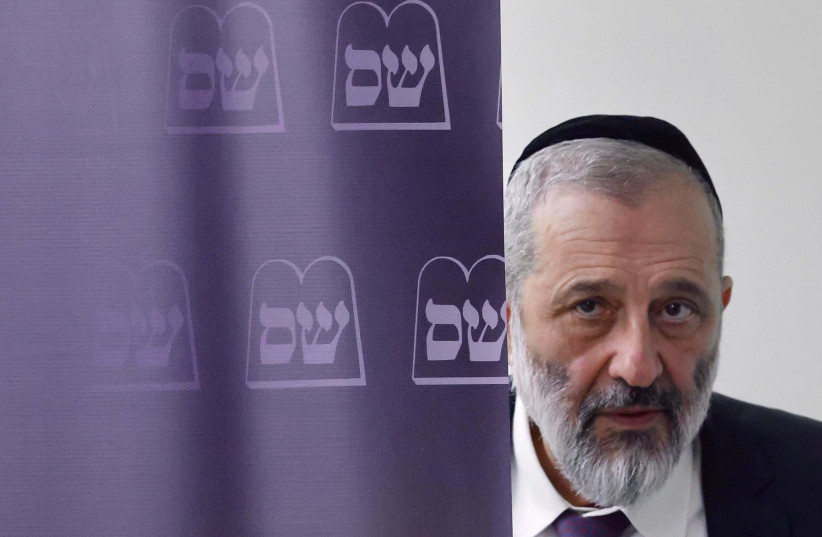A law proposal that is part of the government’s judicial reform and a law that will enable Shas chairman MK Arye Deri to be reappointed as a minister both appear on the Cabinet Committee on Legislation’s Sunday agenda, indicating that on both judicial reform and reinstating Deri, the coalition is determined to move forward despite the widespread protests and threats of a general strike.
Sunday’s committee meeting will be its first since the government’s formation on December 27. The committee, which includes 11 ministers and is led by Justice Minister Yariv Levin, votes on laws proposed by the government and also determines its position regarding law proposals by Knesset members.
The law proposal on the cabinet committee’s agenda that is part of the judicial reform – proposed by Knesset Constitution, Law and Justice chairman MK Simcha Rothman – determines that the High Court of Justice has the power to strike down laws that violate Basic Laws; but only by a unanimous vote of all of the court’s members. Moreover, the law gives the Knesset the power to make laws “immune” to judicial review even with a simple Knesset majority, and even if they contradict Basic Laws.
What powers could these law proposals create?
The “Deri Law,” which was proposed by every MK in the coalition that was not a minister aside from Deri himself, blocks the High Court from intervening in ministerial appointments. The High Court last month ordered Prime Minister Benjamin Netanyahu to fire Deri from his position as health and interior minister, stating that the appointment was “extremely unreasonable” both because of Deri’s criminal history, including a conviction for tax offenses in January 2022, and because Deri misled the courts by promising that he would not rejoin politics to receive a lenient plea bargain in that conviction.
The Deri Law was only put forward this week, and bills proposed by Knesset members need to wait 45 days before their preliminary vote, unless the Knesset Home Committee decides otherwise. The government usually determines its position towards the end of the 45 days. The fact that the law is already on Sunday’s agenda indicates that the Home Committee, led by Likud MK Ofir Katz, will likely decide to skip the 45-day wait.

Rothman’s committee on Wednesday continued to debate a second law that is also part of the reform and includes two provisions: the first gives the coalition control of all appointments of judges by giving it a majority in the Judicial Appointments Committee, and the second blocks the High Court from intervening in legislation of Basic Laws.
Rothman announced on Wednesday that the committee would vote on Sunday to approve the law for its first reading in the Knesset plenum. The plenum must wait at least 48 hours before voting, and therefore the plenum could pass the law’s first reading as early as Tuesday.
Rothman initially wanted the committee vote to happen on Wednesday, and the opposition took credit for delaying it.
“We will not give up. Already today we managed to postpone the votes in the Constitution Committee and once again disrupted the schedules of the trampling coalition,” opposition leader MK Yair Lapid wrote on Twitter. “We will argue, we will state our position everywhere, they will eject us [from the committee] and we will return. This is our country, and no one will be allowed to destroy it.”
However, the postponement may have been an intentional move to slight leaders of protest groups led by former defense minister Moshe “Bogie” Ya’alon, who called in a joint press conference on Tuesday for a general strike and protest in Jerusalem on Monday – when they thought the plenum would be voting on the first reading.
Yisrael Beytenu chairman MK Avigdor Liberman called in a speech in the Knesset plenum on Monday on the members of the committee to boycott the votes. He also called on the heads of the opposition parties to hold a joint press conference on Monday and present a “unified and clear stance” that they will not be part of the “disgraceful” legislative process.
He encouraged the opposition to continue trying to delay the committee for as long as possible, but not to participate in votes, arguing that even a “no” vote gave the vote itself legitimacy.
The Histadrut labor federation, Israel’s largest workers’ union, announced on Wednesday that it would not join the strike.
“We, a workers’ organization that represents many workers’ unions in the business sector and the Israeli economy in general, see in the former minister’s proposal an attempt to severely damage Israel’s economy and the high cost of living for Israeli citizens,” Histadrut CEO Yoav Simchi wrote in a letter to union leaders.
“Without any connection to political positions, harming Israeli civilians with a strike, meant for matters regarding workers’ rights, is an unworthy act and should be left outside of the labor realm. Protest – yes, harming the country – no.”
Some 1,500 IDF combat reservists began a 50-km. protest march on Wednesday titled “Brothers in Arms” from Latrun to the High Court in Jerusalem. The march included people who served in a wide array of units, as well as a number of retired high-ranking officers, including former Mossad head Tamir Pardo, Brig.-Gen. (res.) Matan Vilnai and Brig.-Gen. (res.) Tal Russo.
National Unity MK and former deputy defense minister Alon Shuster also joined the marchers.
“Those who dedicated their whole lives, during their regular service, reserves and as civilians, to Israel’s security and economy, are fulfilling their mission to defend the State of Israel from ruining Israeli democracy,” Shuster said.
